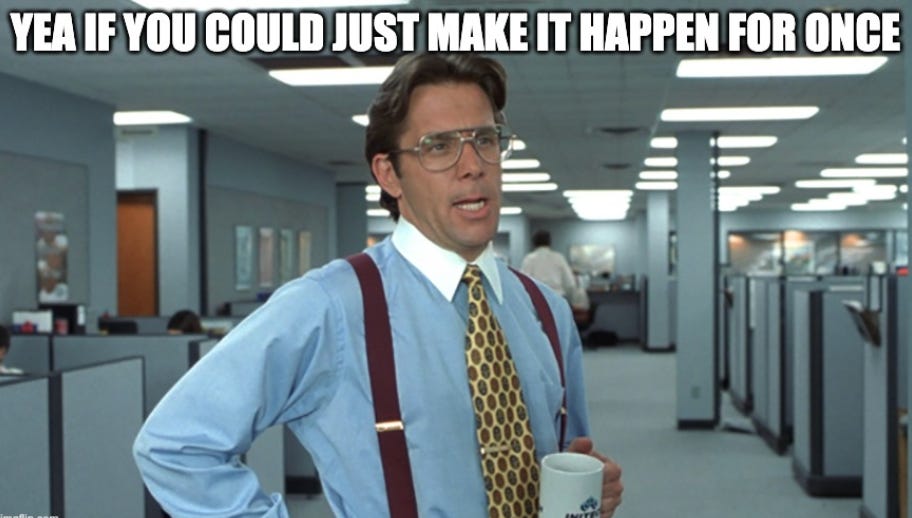The easiest thing in investing is to embrace the bliss of hindsight – ‘I knew it would happen; it was obvious.’ (Totally ignoring that the minority of obvious factors, among a majority of non-obvious factors, somehow were the only factors that survived your thinking, also known as hindsight bias.)
The next easiest thing is to predict what’s vaguely going to happen. You can easily get away with a dubious narrative that is directionally correct. Spare yourself the trouble of offering too many specific details (god forbid a timeline), and there’s a decent chance you'll be mistaken for being a wise wizard.
The hardest part is to correctly execute a good idea, ergo accurately invest in alignment with your anticipation and be correct.
The financial market offers zero style points, no benefits of the doubt, nada favorable interpretations.
Investing is the ultimate referee.
In a very reductionist manner, investing consists of two parts:
having a good idea
executing well on that idea
I’ve previously scratched the surface on the idea part, so this piece will focus on execution.
An actual wise wizard, Charlie Munger, argues that having a good investment hypothesis is not enough and that successful investing requires effective execution of that hypothesis. He has noted that many investors have good ideas but fail to execute them properly. In Munger's view, the ability to execute effectively separates the most successful investors from the rest. His investing companion, Warren Buffet, follows, "In the world of business, the people who are most successful are those who are able to execute well on their ideas.”
Examples
Assuming you're correct in all your ideas and your executions follow a logical chain of thought, you might expect the investment to pay off, but it's not always so.
Idea: Innovative technology is going to disrupt many industries.
Execution: You invest in a fund supposedly focused on innovative disruptive technologies, only to realize that the fund wasn’t able to pick the companies that were actually innovative.
Idea: Demand for electric vehicles will go up.
Execution: You invest in cobalt, only to realize that a better way of making batteries is to swap cobalt for another material.
Idea: Travel will surge after a pandemic.
Execution: You invest in an airline company, only to realize that the company is subject to a new tax.
Idea: Space exploration will be popular with the public.
Execution: You invest in a company perfectly fitted for your narrative, only to see them bankrupt themselves well before common space exploration becomes a thing.
The ‘inversion’ of Munger and ‘falsification’ of Popper
Execution is only as good as your ability to explore as many reasons as possible why the investment can deviate from the narrative.
We want the gap between the idea and the actual investment to be as small as possible. We want to ask ourselves, 'What can go wrong?' To help, let’s turn to the great philosopher Karl E. Popper.
On the subject of science, he claims that theories can never be proven true but can only be subjected to rigorous testing and attempted falsification, meaning we get closer to the truth by seeking evidence that can disprove the theory.
For example, consider the statement "All swans are white." While observing a thousand white swans supports the statement, it doesn't confirm it. The theory could be falsified by discovering a single black swan.
Actively searching for black swans (information that disproves your idea) and not finding any adds strength to the theory.
In the spirit of Popper (and BEYOND CAPITAL), you can never be certain. But if you continually search for black swans (seek to disprove your idea) and don’t find any, at least you’re closer to the truth (a good investment thesis).
"Always invert" is a mental model and problem-solving technique popularized by Charlie Munger. When faced with a problem, people often focus on finding the right steps to achieve their desires. They look for solutions that move them forward.
Munger's advice is to turn the problem on its head. Instead of asking how to achieve success, ask what could lead to failure. By identifying and then avoiding the causes of failure, you indirectly increase the likelihood of success.
For example, if you want to be happy, it's normal to consider what actions or conditions would make you happy. Applying inversion, Munger suggests thinking about what would make you unhappy and then working to eliminate or avoid those things.
Robustness in troubled waters
Execution is only as good as your ability to stick with your strategy during tough times.
There will be days when our conviction turns into a punching bag, taking hit after hit with little rest in between. Making the decision is only the beginning of execution; seeing it through is the real obstacle.
Jack Dorsey, the founder of Twitter and Square, said, "It's not about having a good idea, it's about executing on that idea and building a team to make it happen.”
While managing a business as a CEO and handling a portfolio as an investor differ in many ways, there are certainly many similarities between the two. How can we, as investors, build a team that follows through with our execution? On a large scale, you could build a team of people around you, each embodying key strengths to reach your objective. On a smaller scale, it’s about building an internal team of principles.
According to investor Guy Thomas, "Investing success is about having a well-thought-out investment strategy and the ability to execute that strategy effectively over the long term. You need to be disciplined and avoid emotional decisions, and you need to have the patience to stick to your strategy even when things get tough."
Discipline. Emotional resilience. Patience. These are players you want to have on your team when the inevitable hardship of doubt wants to play you.






